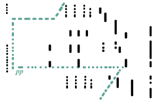Ten singers begin reading a text at precisely the same moment, although for the majority of the piece the text is read silently in each performer’s head, at his or her own pace. Only occasionally does each switch from the voice in their head to the voice we can hear, according to dynamics and timings indicated on a score. At times, the singers overcome their internal voices by whistling unspecified pitches. Throughout, each performer ceaselessly tunes a radio, never stopping at a particular station or frequency. The content of any particular instantiation is therefore arbitrary, and the entirety of the piece – the text, the radio broadcasts, the internal voices – unknowable.
It took some time for it to become apparent that On Not Knowing is largely about Belfast. ‘About’ is an excessively reductive term here, as Belfast is by no means the subject of the text, nor is it reflected in the process by which the piece unfolds; it would be more accurate to say that the piece is indicative of one’s experience of being an outsider in Belfast. Although the extent to which any place can truly be known is always limited, one can always peel away the unknown, gradually revealing the known. However, no amount of excavation will uncover the unknowable; this is the difference between mysteries and secrets. More than other places, Belfast brings this contrast to the surface. History, geography, climate and trauma conspire to conceal a hidden city in its attics, back rooms and underground rivers. The intense warmth of its inhabitants etches a blind spot into your senses. On Not Knowing reflects the dilemma of Belfast onto the fundamental questions of existence and experience.
